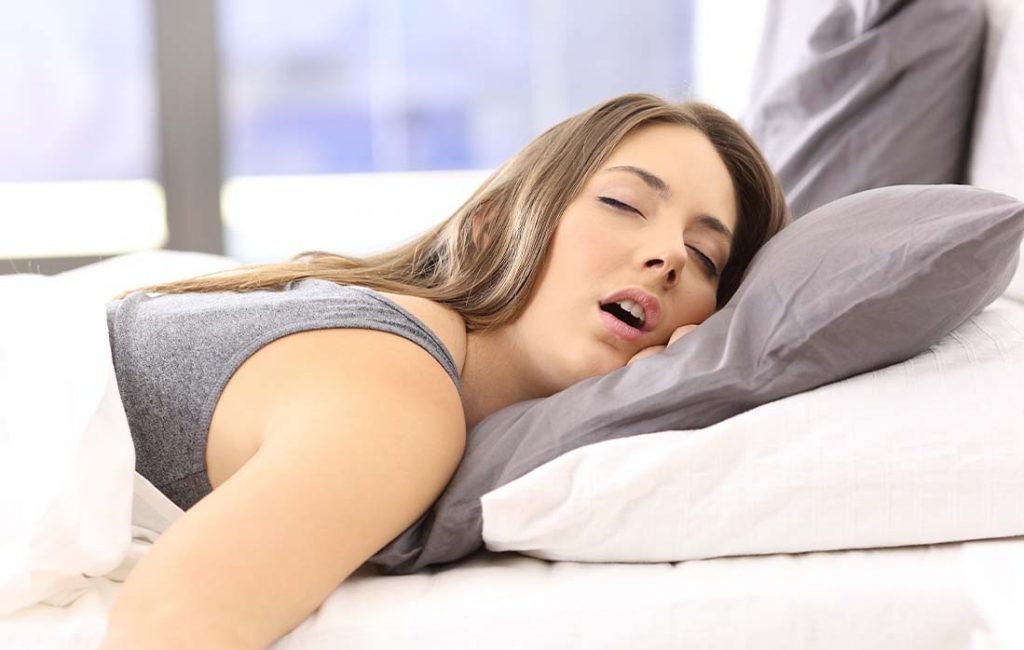
If you’re looking for great makeup dupes, the latest trends in home decor or fashion, or even a good belly laugh or two, TikTok can certainly oblige. But if there’s one area where you should tread lightly, it’s anything concerning your health and wellness. In TikTok’s latest wrong turn, mouth taping to promote nose breathing (and prevent snoring) has recently surfaced as a viral trend on the platform—somewhere to the tune of 24.7M views. And while most viral trends often run the gamut from sublimely ridiculous to raising legitimate questions about where humanity is headed, some trends are outright dangerous — and medical professionals warn, this is one of them.
Just as it sounds, the mouth taping trend involves affixing a piece of tape on your lips to minimize mouth breathing while you sleep. In theory, taping your mouth at night may reduce mouth breathing, keep dry mouth at bay and prevent snoring, but medical professionals are sounding the alarm, warning that the risks of mouth taping outweigh any possible benefit.
Dr. David Chen of Jackson Avenue Dental in Long Island City, NY, says, “People mistakenly assume that snoring is the problem and thus, attempt to tape their mouth to prevent themselves from doing so. [The problem is] we often snore in the middle of the night because we’re trying to get oxygen.”
Chen goes on to say that mouth taping essentially hinders your body’s built-in safety switch. All experts agree that if you think you are having issues with snoring or mouth breathing you should definitely consult your doctor or a sleep specialist.
“By taping your mouth, you’re preventing your body from trying to save your life. It is analogous to swimming and trying to come up for air. The snoring is equivalent to coming up for air,” he says.
Another health hazard of mouth taping stems from the type of tape people are using.
“Many people trying this new trend aren’t using mouth tape,” says Stephen Light, Co-Owner and CEO of Nolah Mattress. “They may use household adhesives, like duct tape, instead. These adhesives may contain chemicals that aren’t safe for ingestion. Nausea is a prime sign that the tape you’re using wasn’t designed for the mouth. Because duct tape and other common household adhesives don’t typically come with ingredient labels, there’s no way of telling how toxic they could be to your health.”
Moreover, the skin on your lips and around your mouth is delicate and thin; repeated taping and pulling off said tape can and will lead to skin irritation and abrasions.
Content creators on the social media platform are furiously pushing mouth taping as a means to force nasal breathing, prevent tooth decay, and of course, curb snoring. But doctors say there is a better way.
“There are some practical methods to help you sleep with your mouth closed,” says Dr. Patrick W. Hsu, MD, a board-certified plastic and reconstructive micro-vascular surgeon and founder of Memorial Plastic Surgery. “During the daytime, make a conscious and intentional effort to breathe through your nose while awake. You should also avoid sleeping on your back because this forces you to take larger breaths and breathe through the mouth to get rid of excess air. If you’re prone to mouth breathing, it’s better to sleep on your side or stomach.”
“Instead of mouth taping to reduce snoring, there are safer methods to consider, like sleeping in an inclined position,” says Dr. Azizi Seixas, founding director of the Media and Innovation Laboratory and Associate Director for the Center for Translational Sleep and Circadian Science at the University of Miami, Miller School of Medicine. “Wedge pillows and bed height adjusters are readily available to help elevate your head into a comfortable sleeping position. In mild cases, sleeping on your side or wearing a nasal strip may help reduce snoring and improve nasal breathing as well.”
“In more serious cases, individuals must see a sleep specialist because their snoring and mouth breathing may be signs of something more ominous like sleep apnea, which is a sleep condition marked by full or partial blockage of airflow while sleeping,” says Dr. Seixas. “Sleep specialists can accurately diagnose these serious conditions, often in the home using at-home sleep monitoring devices, and provide proven clinical interventions.”
The TLDR, according to Dr. Seixas: “Mouth taping is not the answer.”


























